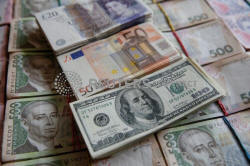|
Underpinning risk appetite in markets, there is heightened
general optimism that Britain won't crash out of the European
Union without a deal and the U.S. Federal Reserve will likely
cut interest rates this week for a third time this year.
The U.S. dollar was "just bouncing around in ranges" ahead of
Wednesday's Fed announcement, said Adam Cole, chief currency
strategist at RBC Capital Markets.
Cole thinks further rate cuts, beyond the one expected on
Wednesday, are overpriced.
"Unless the Fed guidance is explicitly that they're close to
sanctioning another cut then we think that the market
expectation is diminished, then dollar goes up," he said.
The euro was last down 0.1% at $1.1085 <EUR=EBS>, close to
falling to a 12-day low. Cole expects the euro to be limited to
the $1.1050-$1.1100 range.
Against a basket of currencies, <.DXY>, the dollar was up 0.1%
at 97.84, having risen to a 12-day high of 97.93 earlier.
The Australian dollar climbed for a third consecutive session
against the Swiss franc, reaching a six-week high of 0.6824 <AUDCHF=>.
The currency pair, widely considered to be a barometer of risk
sentiment in the currency markets, has risen by 2.4% so far this
month, its biggest monthly rise since April.
Broader moves were modest, though, as caution tempered the mood.
The New Zealand <NZD=D3> and the Canadian dollars <CAD=D3> edged
slightly higher before erasing some of these gains.
U.S. President Donald Trump said on Monday a trade agreement
with China looked to be ahead of schedule, without detailing the
timing. Washington also said it was studying whether to extend
tariff suspensions due to expire in December.
"Global risks remain but have shown signs of subsiding," Philip
Wee, FX strategist at Singapore's DBS Bank said in a note.
The British pound, meanwhile, <GBP=D3> was flat on the day
around $1.2860 after initial losses were erased when Labour
leader Jeremy Corbyn said he would support an election. The U.K.
parliament is due to debate a new election bill on Tuesday.
Prime Minister Boris Johnson is widely expected to win the
simple majority needed.
On Monday, Johnson failed to win the 2/3 majority necessary to
call an election. The vote took place after the European Union
agreed to a three-month flexible Brexit delay.
(Reporting by Saikat Chatterjee and Elizabeth Howcroft;
Additional reporting by Tom Westbrook in HONG KONG; Editing by
Giles Elgood and Chizu Nomiyama)
[© 2019 Thomson Reuters. All rights
reserved.] Copyright 2019 Reuters. All rights reserved. This material may not be published,
broadcast, rewritten or redistributed.
Thompson Reuters is solely responsible for this content.

|
|





